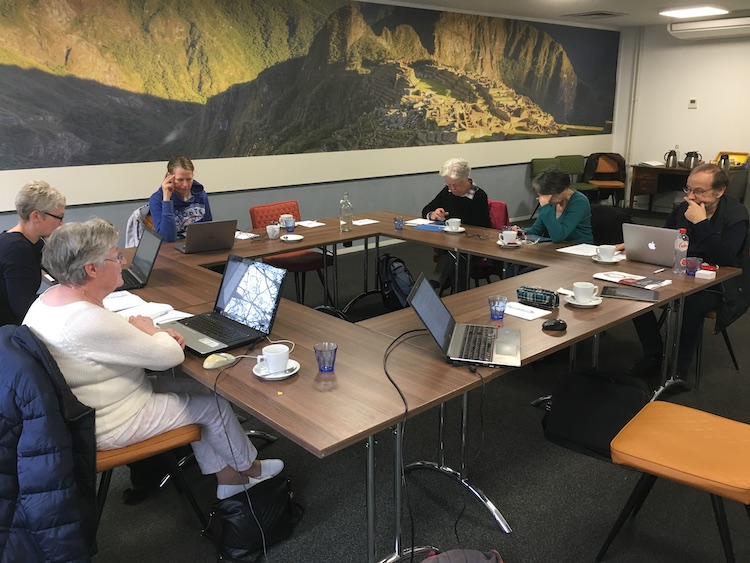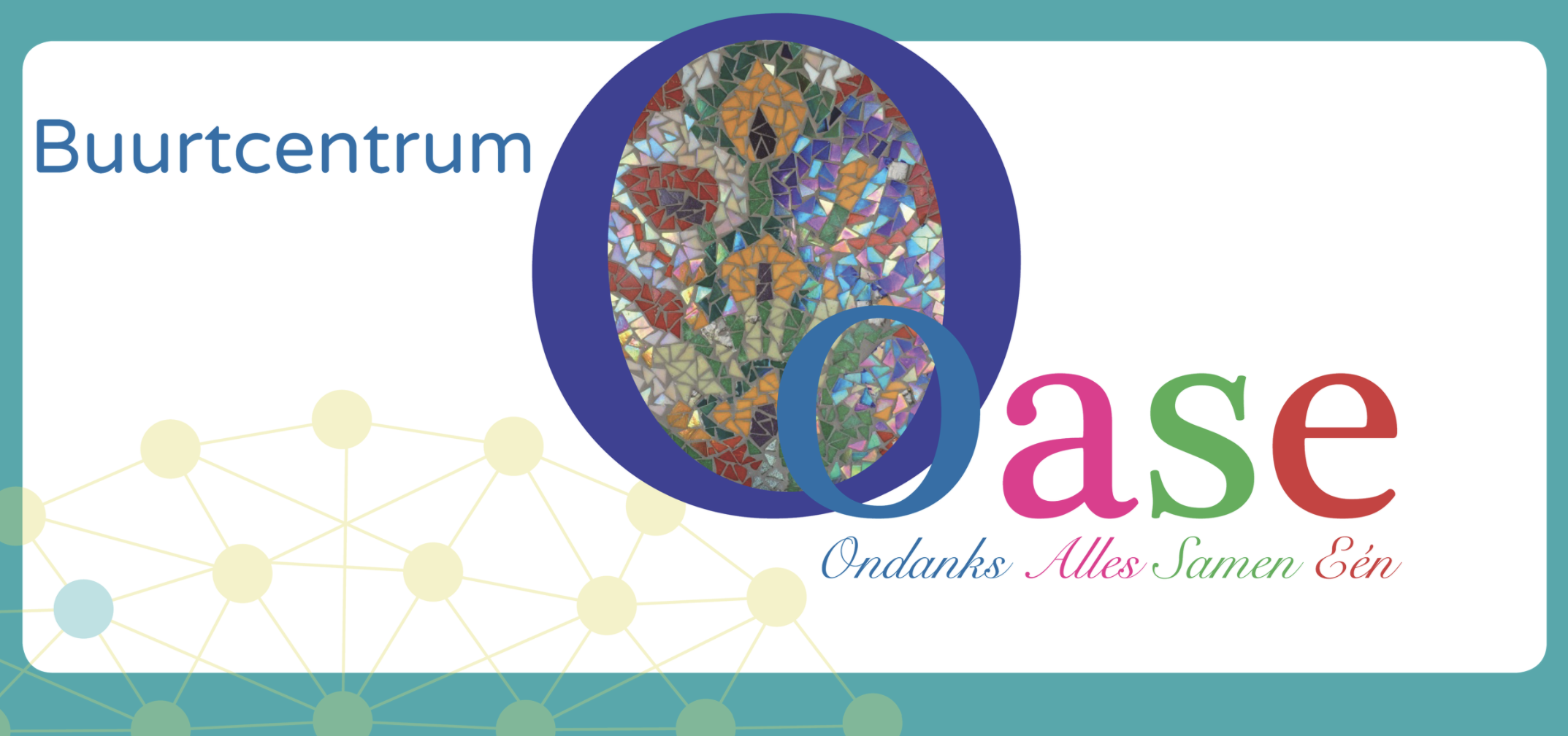
The Utrecht SIG met on the evening of Wednesday 11 March, in a new location. If you have been following this you will know that the Park Plaza has turned out to be unsuitable, and other central spots are too expensive for meetings that are free to members. Convener Maartje Gorte had found a surprisingly accessible if not central spot, buurtcentrum Oase, right across from Utrecht Zuilen station. Four of us joined Maartje in a clean and quiet meeting room (only now and then, when a door was opened, did we hear the distant strains of Bollywood karaoke from the main hall downstairs). Since there was no text to work on this time, we were free to discuss whatever was on our minds.
Inevitably this included coronavirus, but also a few things like the new mandatory disability insurance for ZZP’ers. Opinions differed on this one; some of us resented it, some of us welcomed it. A couple had looked into insurance before and found it simply too expensive, especially given it usually does not pay out for a year or longer after you have to stop working. One member had applied for it some time ago, but their application was rejected for reasons that made absolutely no sense. The rates under the mandatory system are more reasonable than before. In any case, it is not expected to take effect until 2024.
We also discussed the overuse and near-meaninglessness of the word duurzaam (‘sustainable’ but these days it’s used to mean the same thing as ‘environmentally friendly’). Other subjects included resources for sustainability, a new member’s activity leading night-time city walks in that very area, and John Linnegar’s grammar workshop the weekend before. Finally, we packed up the snacks we had brought to share, and walked the 80 metres or so to catch our trains at Zuilen.
The next meeting, provisionally scheduled for 13 May, will be live online. Check the Events page for details.
In this new blog series, we will highlight the different Special Interest Groups (SIGs) SENSE has to offer. SIG meetings are open to all members, and guests are welcome to attend one or two meetings before deciding whether they would like to join SENSE. For upcoming SIG meetings, check the SENSE Events calendar. Contact the SIG convener for more information or to suggest a meeting topic. If you would like to start a new SIG, contact our SIG and Social Events Coordinator. In this edition, we talk to SENSE Ed convener David Barick.
Can you tell me a little about yourself?
I’ve been a member of SENSE since 2012, which was when I set up my language business. Although I also work as a translator, most of my time is devoted to English teaching. I specialize in academic English, although I’ve taught conversational and business English as well.
What is SENSE Ed and who is it for?
SENSE Ed is a sounding board and information source for people with any sort of involvement in English-language education. As I mentioned above, I’m active in several different areas of education. Some people who attend our meetings have a similar activity pattern, while others devote themselves to only one of those areas. It doesn’t matter as there’s room enough for everybody, and I try to alternate the themes of our meetings so that each field gets attention in turn.
How did SENSE Ed get started?
I don’t know the exact year, but it was shortly after I joined SENSE that Iris Maher took the initiative to set up this group. I had already had some mentoring talks with her, so when she told me about her intention of starting this group and invited me to come and give it a try, I was happy to join. After a few years, Iris asked me to replace her as convener.
How often does SENSE Ed meet up?
We meet twice a year, on Saturday afternoons.
How many people generally attend SENSE Ed meetings?
Anywhere from seven to ten.
When and where will the next SENSE Ed meeting be?
We meet in Utrecht – as you know, exact venues are in a bit of doubt at the moment there. I expect the next meeting will be held in late May or early June barring unforeseen circumstances, if you know what I mean.
Interested in joining the next SENSE Ed meeting? Keep an eye on the Events page!
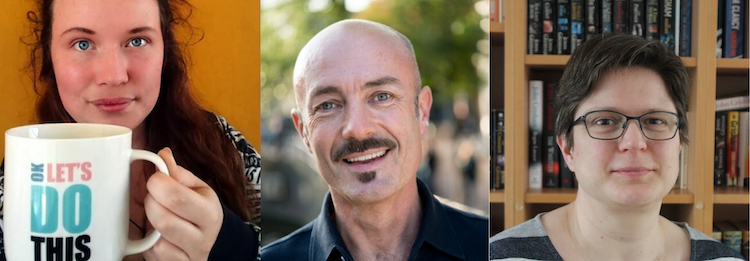
Left to right: Anne Oosthuizen, Matthew Curlewis, Margreet de Roo.
At the AGM on 28 March, the Society voted in three new members for the SENSE Executive Committee. But who are they and what makes them tick? SENSE Chair Mike Gould provides some more information about each of them.
SIG and Social Events Coordinator: Anne Oosthuizen
Anne, who’s Dutch, was born and raised on the outskirts of Amsterdam Zuidoost. After she finished secondary school, she first spent ten months as an au pair in London. Back in Amsterdam, she did two years of teacher training (TEFL) before taking her education to an academic level. She spent the final year of her BA programme in English in New Zealand, writing a thesis on translation. This is also where she met her partner, Jack. Back in the Netherlands, she worked in door-to-door sales and did charity work, before starting an MA in Translation Studies. That year, Jack moved here from the UK, and they have been living together ever since. She graduated six months ago (cum laude) and has since been working part-time at at fellow SENSE member Ellen Singer’s translation agency AzTech Solutions. When not at the office, Anne is establishing herself as a freelance translator and editor, focusing on the creative and academic sectors. She regularly works for Dave Thomas’ company NST Science (EN-EN revision) and has done translations for cultural festivals, such as the Amsterdam Light Festival, and a book translation (How to Go Meat-Free/100% Vleesvrij by Stepfanie Romine). Her super-special niche, which she has still to find her way into professionally, is song translation.
CPD coordinator: Matthew Curlewis
Our new Continuing Professional Development Coordinator, Matthew, is an Australian. He’s thrilled to have this opportunity to help create workshops and events for SENSE that he will endeavour to make practical and useful at a minimum – while also striving towards making them inspiring, challenging and rewarding as a maximum. ‘Training and re-training’ are pretty much integral to who Matthew is. He moved from New York City to Amsterdam in 2003 to attend the Binger Filmlab and make a career transition from website producer to professional writer. Since then he’s worked as a journalist, screenwriter and copywriter and founded the writers’ workshop Amsterdam Writers. Before moving to New York, he also enjoyed successful mini-careers as a restaurateur, a contemporary dance publicist/manager in Sydney, Australia, and as a dancer and performance artist in Tokyo, Japan, as well as at numerous arts festivals in Europe, Australia and North America.
Secretary: Margreet de Roo
Our new Secretary, Margreet de Roo, is Dutch. She studied German at Groningen University and then worked as a teacher at a secondary school. In 2003, she moved to Nairobi, Kenya, with her husband, who works for the Christian charity Mission Aviation Fellowship as a programmer. During her nine years there, their two daughters were born – now 15 and 13. In 2012, her family moved to Zwolle when she chose a new career: editing and translating. She got some training and set up her business, Maneno tekstredactie, in 2013. Maneno is Swahili for words or text. Since then she has been working as an independent editor of Dutch texts and an English-to-Dutch translator. She enjoys the freedom and flexibility of being a freelancer and working from home suits her very well. As a non-native speaker of English, Margreet wasn’t sure SENSE was the right organization for her at first. However, attending a SIG meeting at the end of 2018 convinced her that it was. She sees the value of a professional organization that combines informal contact with professional development. And the role of Secretary seems to be the perfect fit for Margreet. She says: ‘it will allow me to give back to SENSE in a way that matches my interests and talents.’
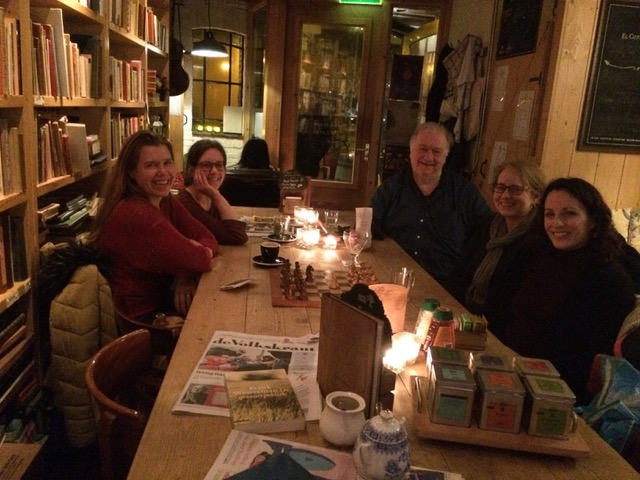
After a year’s hiatus, SIG Far North finally convened on 22 January, with 6 SENSE members meeting at 20:00 at Café De Graanrepubliek in Groningen. As has been the tradition for our SIG, those who wished to meet up for dinner before the event did so at Traiterie De Olijfboom.
The January meeting was a chance to re-connect after a long time apart, and it was a pleasure to welcome two members back into the fold after several years away. Keeping it informal did not mean, however, that the conversation was not language-focussed. One of the subjects was the ongoing struggle between professional translators and the Ministry of Justice and Security, an issue previously highlighed on the SENSE blog. We discussed the talks that were given at METM2019, as well as the SENSE conference in Maastricht, where one SIG member was scheduled to give a presentation. (Sadly, the conference has been cancelled because of the coronavirus.) Two other members gave spirited testimonials on the benefits of PerfectIt proofreading software.
We also discovered that one of us may have coined the phrase ‘From Bench to Bedside’ in a text she wrote back in 2009, and we recounted how much this expression has now become part of the medical lexicon, especially in the context of precision medicine. Discussion also touched on everyone’s work and home lives, and the challenges we all face in getting enough work, but not too much (and the struggle to take that one necessary holiday).
We ended the evening talking about bilingual children, then drifting into a discussion of how sign language is a model for linguists and to recent examples of where we had seen sign language used in public forums.
It was good to meet again, and we look forward to more SIG Far North events in the future.

I’m happy to announce that we held the first (modern-day) SenseMed-sponsored meeting on 20 February in Utrecht. The topic, entitled ‘Editing Medical/Biomedical Texts: Proofreading or Heavy Lifting?’ was a round-table discussion of the many challenges (and rewards!) that editors face when editing medical and biomedical texts. A total of 20 members and non-members from a variety of backgrounds came to Utrecht and shared their own experiences. We discussed common mistakes (eg, ‘cases’ vs ‘patients’, ‘prevalence’ vs ‘incidence’), how to deal with the medical profession’s fondness (obsession…?) for over-using , and then edited examples of text, figures and tables from authors of various nationalities including Dutch, Chinese and Israeli.
Particularly interesting was the realization that just like with translators, two different editors rarely make the same changes and suggestions. Some editors take a heavy-handed approach, also giving feedback on the science itself (eg, suggesting a helpful control or alternative way to interpret the data). Some editors focus solely on the language (‘Is this sentence grammatically correct? Then no need to change anything’), and of course many fall somewhere in the middle. We also talked about the client’s needs and expectations, and how to ensure that our role as editor meets (or hopefully exceeds) those expectations. The meeting was followed by drinks and dinner. Given the clear success of this meeting, our plan is to make this a regular event, so watch your inbox and this space for news regarding the next SenseMed gathering!
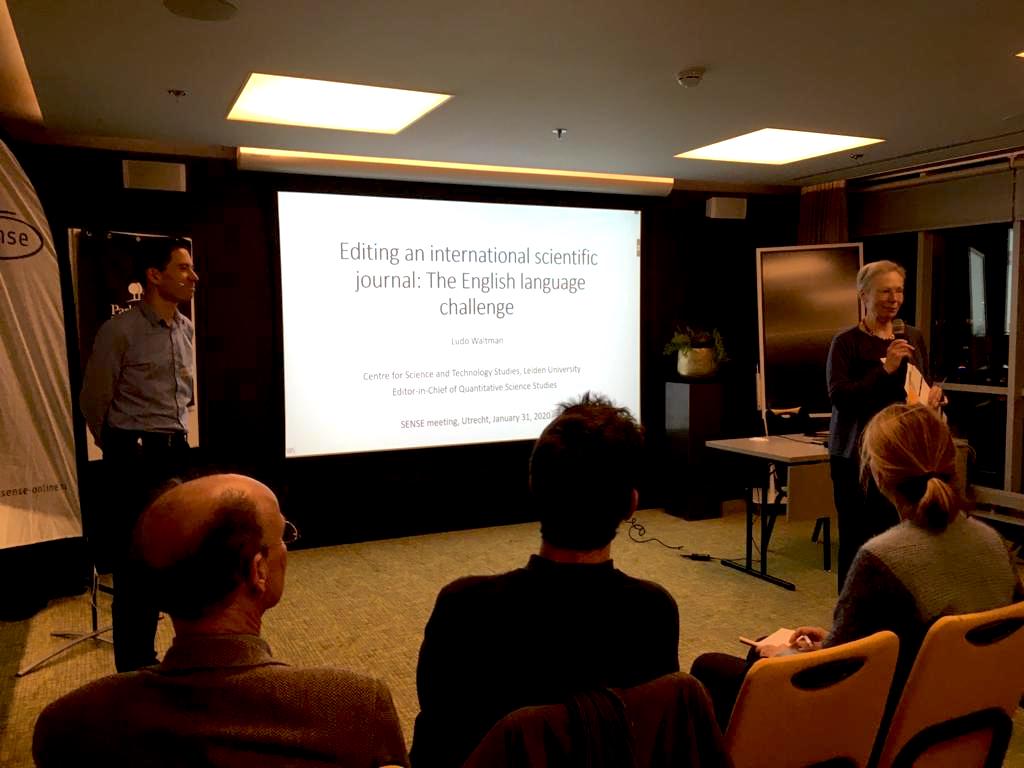
In this new blog series, we will highlight the different Special Interest Groups (SIGs) SENSE has to offer. SIG meetings are open to all members, and guests are welcome to attend one or two meetings before deciding whether they would like to join SENSE. For upcoming SIG meetings, check the SENSE Events calendar. Contact the SIG convener for more information or to suggest a meeting topic. If you would like to start a new SIG, contact our SIG and Social Events Coordinator. In this edition, we talk to UniSIG convener Joy Burrough-Boenisch.
Can you tell me a little about yourself?
I am one of the founding members of SENSE: the tea party at which a group of about ten discussed the idea of starting an organization for English-native-speaking editors was held at my house in Wageningen. I’ve been editing the English of Dutch scientists ever since the late 1970s.
What is UniSIG and who is it for?
UniSIG is for SENSE members with clients in academia.
How did UniSIG get started?
It has grown from the group that drew up SENSE’s guidelines for proofreading student texts, which was set up after former SENSE member Camilla Brokking-Maltas expressed surprise that whereas all Australian universities had such guidelines in place, there weren’t any guidelines in the Netherlands. Initially, Camilla and I were co-conveners but after Camilla resigned from SENSE to pursue another career, I stayed on as convener.
How often does UniSIG meet up?
UniSIG meetings are held three to four times a year.
How many people generally attend UniSIG meetings?
From the outset, they have attracted double-digit audiences. No less than 25 members attended the first meeting in June 2016 and registrations for the meeting held this year on 31 January at one stage exceeded 45! Big turnouts happen not only because so many SENSE members edit, translate or teach for universities and their staff or students but also because we have had excellent speakers (often recruited from the SENSE membership). Another factor could be the growing general awareness of the ethics and challenges of editing for Dutch university clients, as the rise of essay mills has hit the headlines in the UK and the Netherlands and the editing of non-native-English researchers and students is now a hot topic in the applied linguistics world (one of the leading researchers in the field, Nigel Harwood, has twice spoken at SENSE events). And as meetings are held on a Friday, maybe the post-meeting drinks-cum-networking in the bar and the opportunity to meet to eat before or after are irresistible.
When and where will the next UniSIG meeting be?
Unfortunately, planning a suitable venue for an audience of between 15 and 25 when registrations fluctuate right up to the day of the meeting has become a headache, especially as the cost of hiring venues for more than 10 people are high and have to be paid by SENSE regardless of whether everyone who’s registered turns up. So, for the upcoming meeting on 17 April in Utrecht, we’re reluctantly requiring a registration fee of €10, which will cover at least part of the fee the venue charges per person. SENSE will continue to pick up the tab for the (not inconsiderable) room hire charge. What you’ll get for your money is an excellent is enough to tempt anyone – at a professional, easily accessible venue, plenty of convivial and knowledgeable fellow attendees, plus tea and coffee. A great way to finish the week and start the weekend!
Interested in joining the UniSIG meeting on 17 April in Utrecht? Click here to register!
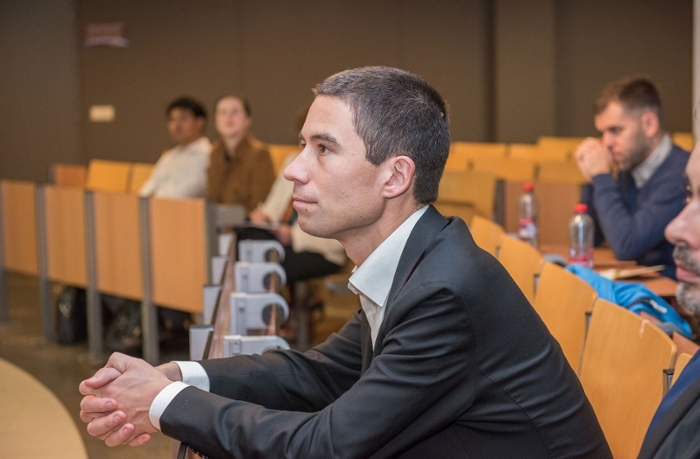
Professor Ludo Waltman. Photo courtesy of Universiteit Leiden.
The recent UniSIG meeting held in Utrecht on 31 January drew a large crowd and generated much discussion. This was not too surprising given that the invited speaker, Prof. Ludo Waltman, touched on an intriguing and relevant topic, namely ‘Editing an international scientific journal: The English language challenge’. As the deputy director of the Centre for Science and Technology Studies (CWTS) at Leiden University, a researcher in the field of bibliometrics and scientometrics, and currently the Editor-in-Chief of Quantitative Science Studies, he has amassed unique insights into research management and science policy, and how these impinge on publication practice. In his presentation for UniSIG, Prof. Waltman discussed four main points related to the English language challenge: authors, China, peer reviewers and journal publishers.
Research globalization can have a negative impact on authors from non-English-speaking countries
In an increasingly globalized research publication system (explore here) and under pressure to publish in highly ranked journals to stay competitive and funded, many researchers whose native language is not English submit their work to international journals. From a journal editor’s perspective, a recurrent question in assessing submissions is where to draw the line on language quality. While there is no shortage of available language services, it is unclear whether authors that need the most help can actually afford it, and whether the cheapest of these services are indeed of high enough standard.
Another issue related to authors from non-English-speaking countries publishing in international journals, especially in the fields of social science and the humanities, is the risk that research on locally relevant, impactful topics may go undone in the drive to publish in international journals, or alternatively cost researchers all-important citations when publishing in local-language journals. Being aware of the benefits and drawbacks of research globalization and the use of citation metrics in that setting is therefore paramount, as outlined in the Leiden Manifesto for research metrics.
Recent changes in Chinese publication policy may affect submissions from Chinese authors
A related and subsequent point that Prof. Waltman focused on was the significant rise in publications from Chinese authors. Depending on what database is used, China has now almost caught up – or even overtaken – the US in the number of English-language manuscripts published in international journals. This has been largely driven by science policy encouraging globalization of Chinese research, not only by financially rewarding authors for publishing in highly ranked international journals, but also by funding students to attend universities abroad.
For editors of international journals, the increase in volume of manuscripts alone is a persistent issue, with language quality adding another layer of complexity. It will be interesting to see how these trends change in the near future, in light of the apparent change in publication policy in China, which aims to encourage scientists to publish their best science in China.
What to do about poorly written peer review reports?
Where there are manuscripts, there have to be peer reviewers, and these pose the next challenge for a journal editor. In the days of increasing manuscript volumes, finding appropriate reviewers has become a big challenge. Since journal editorial boards alone cannot handle the volume of manuscripts submitted, other experts in the field are often asked to help with the peer review process. But while help from language editors can rectify authors’ poor English, similar assistance is rarely sought or provided for peer review reports. Reviewers' poor English-language skills, along with an increasing trend for open peer review, can discourage many potential reviewers from participating.
For journal editors, one potential way to mediate this problem would be to adopt a review process similar to that of the journal eLife where the handling editor facilitates a discussion among all reviewers, and then formulates a single clear list of necessary revisions to share with the author. Another possibility is for language editors to offer peer review report editing services, although it is unclear whether the researchers that need such assistance the most could afford it.
Publishers decide on whether open access publication fees cover copyediting
In the final part of his presentation, Prof. Waltman discussed publishers, their wide-ranging views on supporting language quality, and several other aspects important in scientific publishing. As Editor-in-Chief, first of the Journal of Informetrics, published by Elsevier, and currently of Quantitative Science Studies, published by MIT press, he has first-hand experience (more on Prof. Waltman's move from one journal to another can be found here.
We discovered that publishers differ hugely in the amount they charge for open access publication. Within this pricing structure, one publisher may provide no copyediting, while another is able to provide a relatively thorough service to its authors. Therefore, journal editors often have their hands tied, even if they would like to provide more help to non-native-English authors.
The work of authors' editors is unlikely to be affected by new developments just yet
To conclude, Prof. Waltman outlined two possible developments that could ease the English language challenge in the future. One that SENSE members are already keenly aware of is machine translation. Though not yet on par with a qualified human translator, it will undoubtedly continue improving and perhaps soon level the playing field for non-English-speaking researchers, especially those with restricted budgets. Another possibility is that, instead of publishing articles, researchers may one day simply publish their data as nanopublications – defined as the smallest unit of publishable information. In the meantime, though, it is clear that SENSE members will still have a lot of work on their hands helping international authors refine their manuscripts.
This blog post is a summary; for the full event report, please see the SENSE Forum (members only). A final note: The PDF of Prof. Waltman’s presentation is available to SENSE members upon request by contacting the convener, Joy Burrough-Boenisch, but it is not to be posted online.
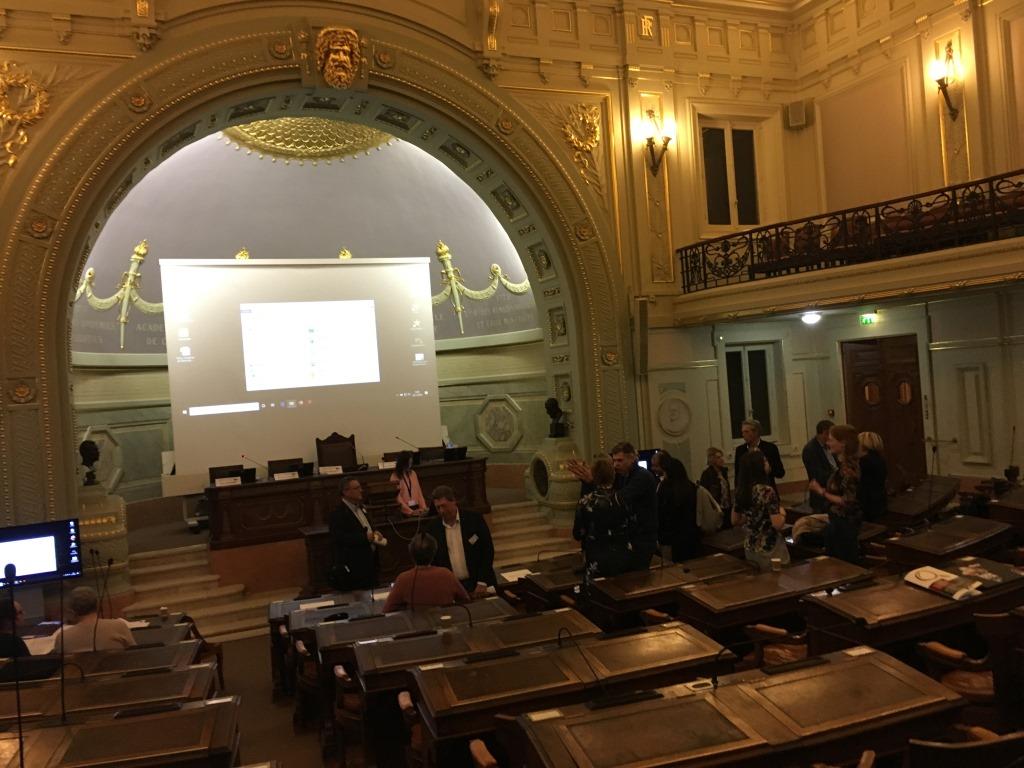
Methods in Research on Research (MiRoR) is a project sponsored by Marie Curie Actions, a body funded by the European Union. MiRoR’s specific aims are to reduce waste and increase research value in clinical research. SENSE members who attended the METM19 conference last September in Split may have attended presentations by researchers working for MiRoR.
On 25 November last year, I had the pleasure of attending a one-day conference that marked the conclusion of this project. It was titled ‘Meta-research on transforming clinical research’ and was held in the very grand surroundings of the National Academy of Medicine in Paris. All 15 MiRoR fellows were on hand with poster presentations of their individual projects.
The keynote speaker was John Ioannidis, who is known as ‘the father of meta-science’. His 2005 article ‘Why most published research findings are false’ is one of the most often downloaded and cited scientific papers of all time. He and the other speakers in the first half of the program focused primarily on setting up and planning research in ways that can prevent waste. These presentations were illuminating, but didn’t relate directly to language quality in research articles.
The second half of the program, however, was very relevant for those working with academic and scientific English. It was devoted mostly to avoiding waste by writing articles in a more effective and transparent way. Topics investigated by some of the MiRoR fellows included encouraging the use of reporting guidelines, and reducing the number of exaggerated and/or poorly worded claims in research articles. We learned that a number of mechanical methods are now being created to achieve these aims. For example, Halil Kilicoglu of the University of Illinois gave a fascinating presentation on how text mining can be used to determine the use of reporting guidelines in a scientific article.
All in all, it was a great day that provided an opportunity to rub shoulders with some very distinguished academics and researchers. Extensive documentation on MiRoR is available via the website. For the full conference program, click here. Individual presentations can be found here.
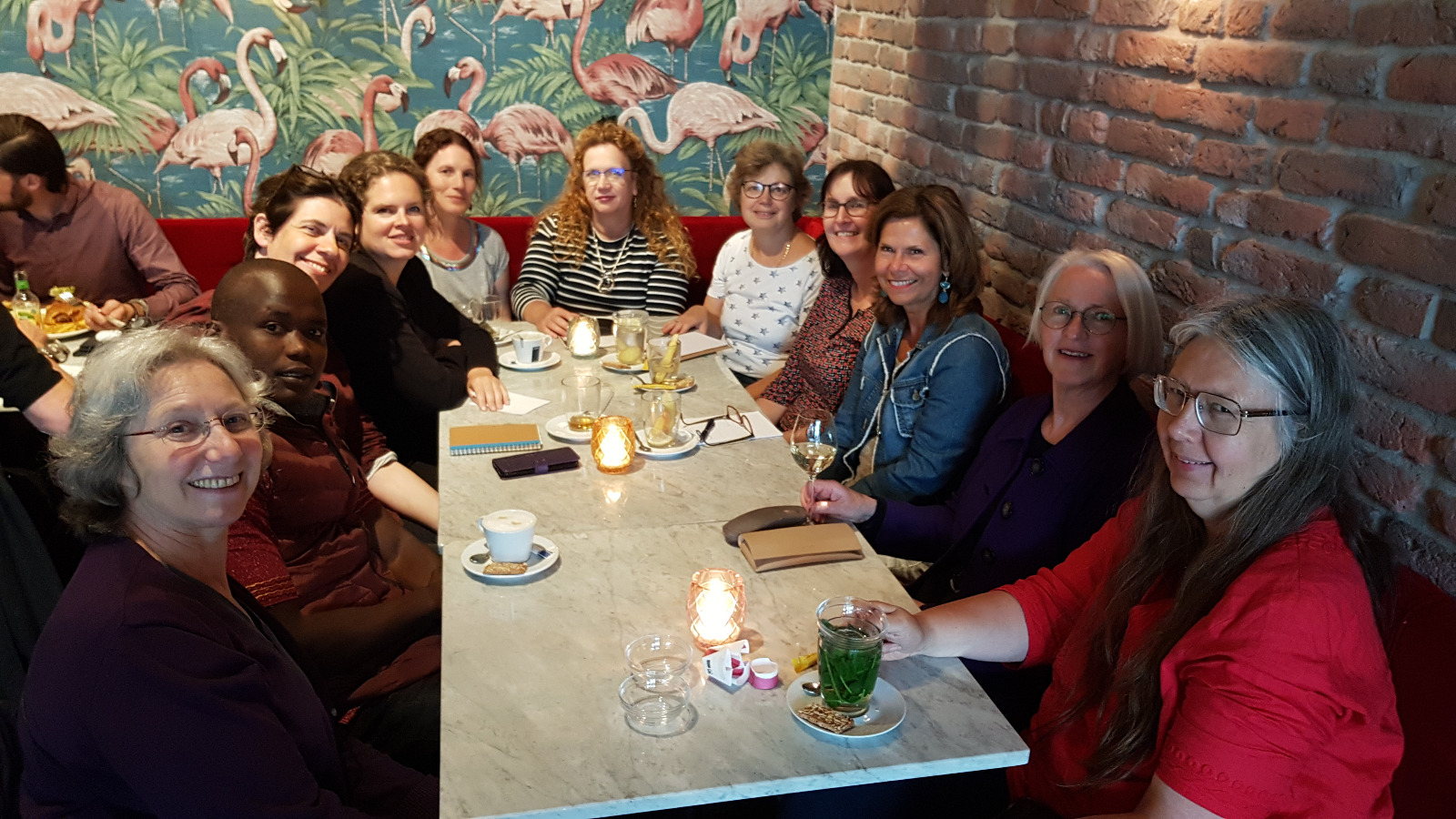
I started out as a language professional in 2010 after I quit my PhD in Genetics halfway through. I quickly found SENSE and the Utrecht SIG. It was – and remains – a delight to be among people whose brains work the same way as mine. Professionally, I enjoy working with technology companies and universities: complex, but broad enough to stay interesting.
The SIG started as the aptly-named Utrecht Translation Group over 20 years ago and stayed true to its origins. It’s for people who enjoy traveling to Utrecht to discuss translations; anything from analysis reports to opera. When we have an interesting text, we spend the first half of the meeting discussing the text and the second half on shop talk. When we don't have a text, there’s more time for shop talk. The SIG is interesting to a wide audience: even if you’re not a translator, it can be good practice to wrap your head around a translation puzzle and think about language and culture in a different way.
Every second Wednesday of odd-numbered months. The last year has been hit and miss due to trouble finding a suitable venue, but we’re trying out a new place for the upcoming meeting.
Anywhere from 4 to 20, usually around 8. Luckily, we always get a good conversation going, no matter the group size.
Wednesday 11 March in community centre Oase, from 19:30 to 21:30. We're still looking for a text to discuss, so if you've recently done a troublesome, funny, cross-culturally complex or otherwise interesting translation, please let me know!
Would you like to attend the next Utrecht SIG? Register at the Events page today!
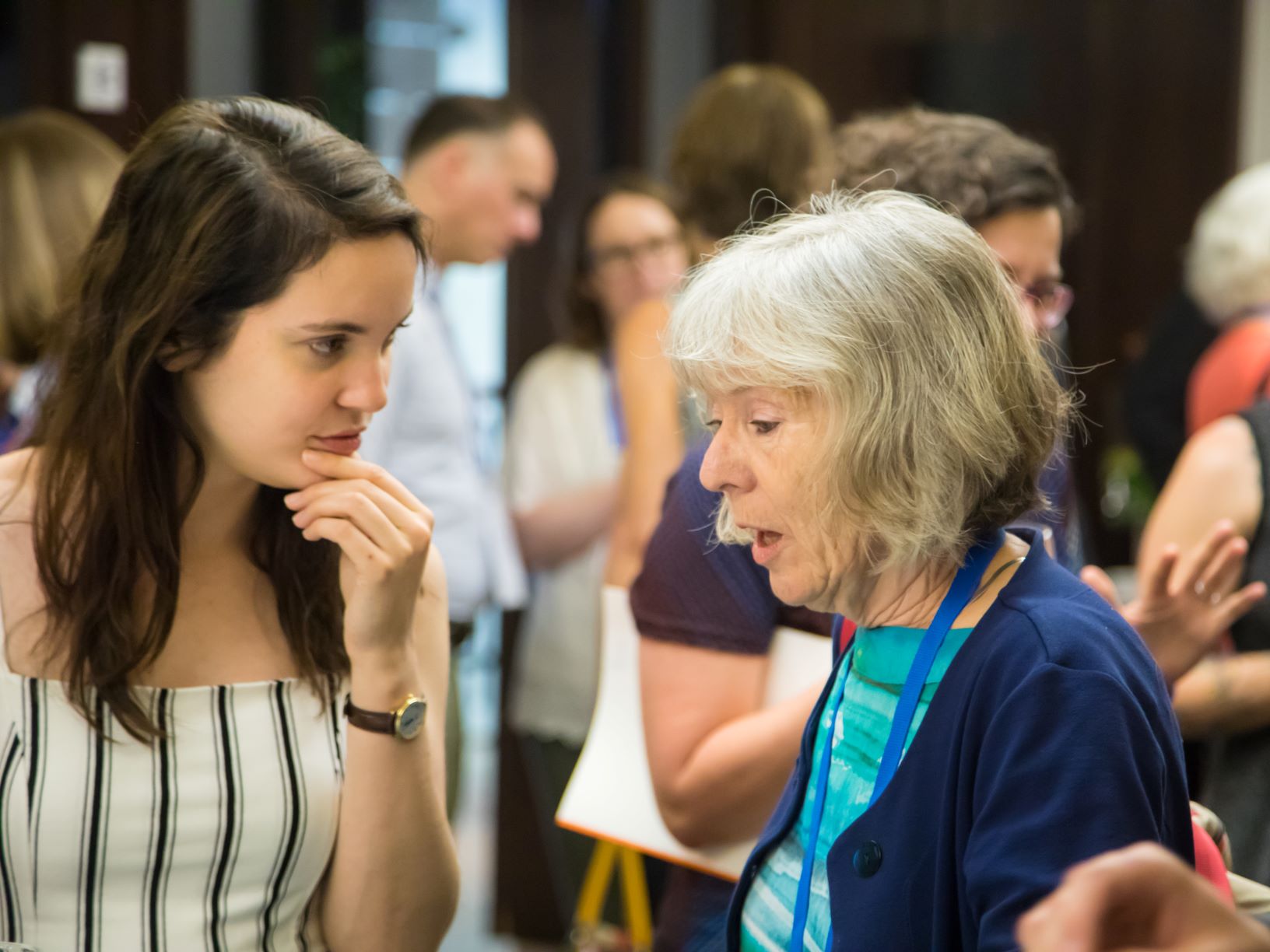
Photo by Michael Hartwigsen, taken at the SENSE 2018 Conference in Den Bosch. All rights reserved.
With the SENSE 2020 conference only a few months away and registration now open, it’s time to take a closer look at some of the presenters. They come from all around the world: Luxembourg, Spain, Finland, Canada, the United Kingdom, Belgium… Several presenters come from outside the Society, but the SENSE delegation is nothing to scoff at! Below are the names of all those representing SENSE during the pre-conference workshops and conference programme:
Ann Bless
Anouschka Schutte
Ashley Cowles (panel coordinator)
Claire Bacon
Daphne Visser-Lees
David Barick
Ellen Singer
Jackie Senior
Jenny Zonneveld
John Hynd
John Linnegar
Joy Burrough Boenisch
Justine Sherwood
Kate McIntyre
Laura Damiano
Maria Sherwood Smith
Marieke Krijnen
Paulien Copper (panel coordinator)
Sally Hill
Tony Parr
For an overview of all workshops and presentations, check out the full conference programme!
What are you hoping attendees will take away from your session?
Claire Bacon: “Language professionals with plenty of good clients and who are regularly turning work away probably don't need to start blogging. My talk is aimed at those of us looking to build our client base. I am hoping that my talk will inspire others to attract the clients they want by sharing useful, good-quality content. I understand how intimidating it can be to put yourself out there in this way, so I will also give tips on responding to criticism – and accepting compliments – publicly.”
Marieke Krijnen on her talk about the mental and physical health challenges faced by digital nomads: “I’m hoping attendees will walk away with some concrete tips and tools, and feel that they are not alone.”
Ashley Cowles: “Unexpected tips, useful tricks and silly ideas that will help or at least resonate with other parents trying to juggle work and kids. The main thing is to remember that even the most experienced juggler inevitably drops some balls from time to time – just try to make sure you don’t drop the most fragile ones.”
Ann Bless: “An example of a four-day course and advice on how to teach a successful course on scientific writing as well as my support, from a distance, if they start teaching.”
Justine Sherwood: “That they will look into alternative ways to travel instead of just hopping on a plane, something we’ve become too accustomed to.”
What are you most looking forward to in regards to the conference?
Jenny Zonneveld: “I'm particularly looking forward to spending time with colleagues and friends I otherwise only chat with digitally. And of course learning from them too. The programme looks fascinating, so it's going to be hard to decide which breakout sessions to attend!”
John Linnegar: “Learning from colleagues, especially from the younger, more tech-savvy ones about using social media to enhance one's business. Networking. Catching up with friends in the business. And savouring whatever Maastricht has to offer.”
Sally Hill: “I’m really looking forward to meeting up with both longstanding colleagues and new people, especially attendees from other countries. For me the conference is just as much about networking as it is about sharing and learning from each other.”
